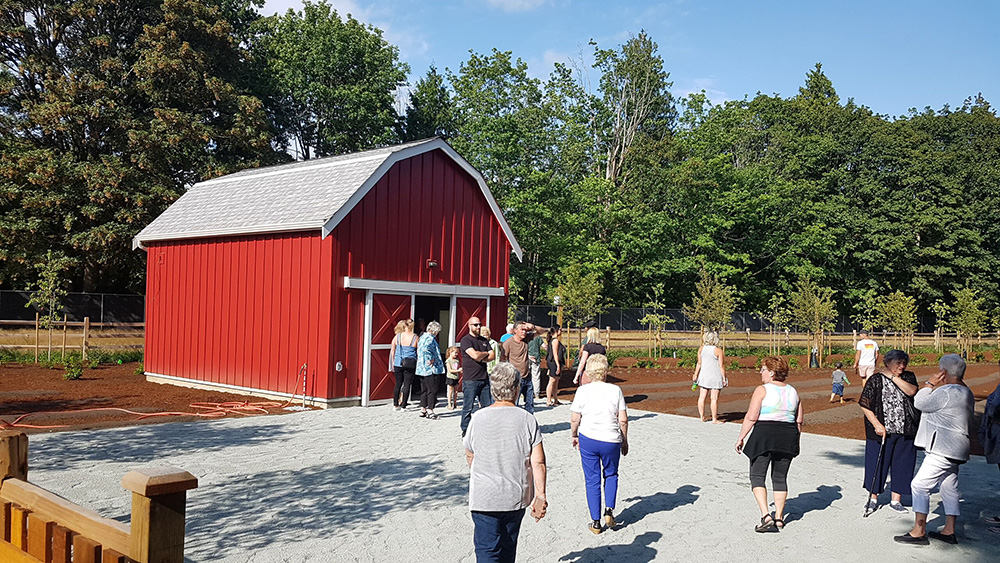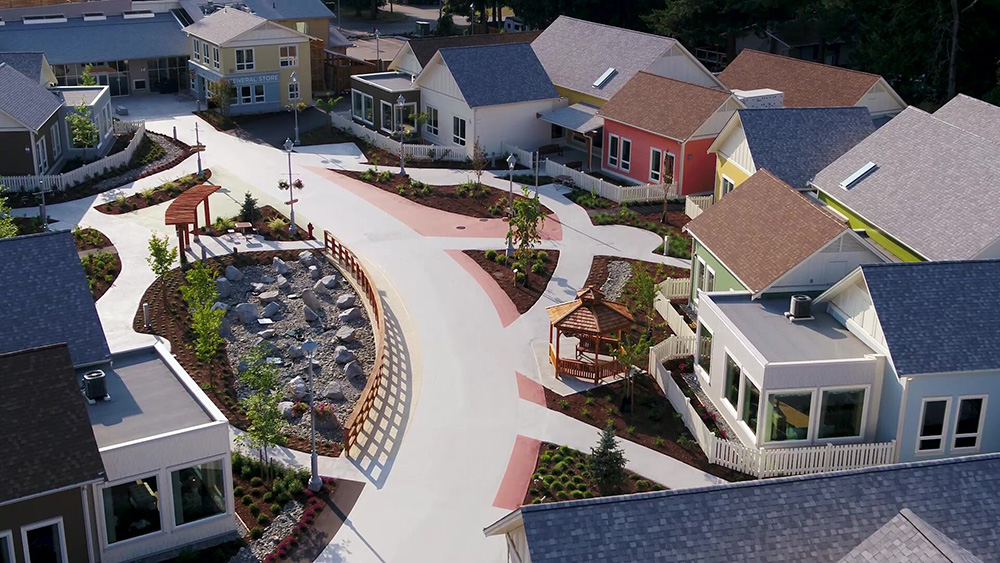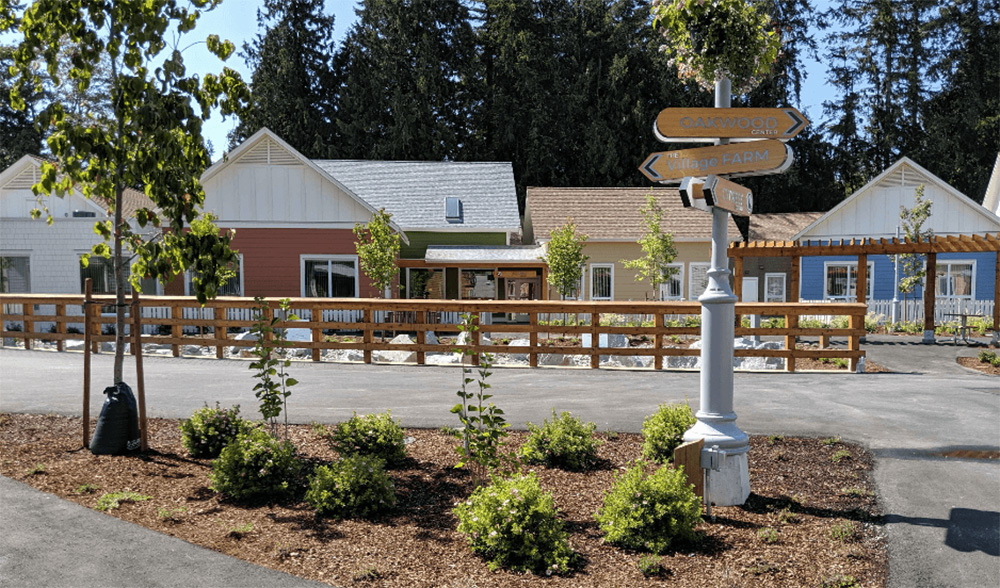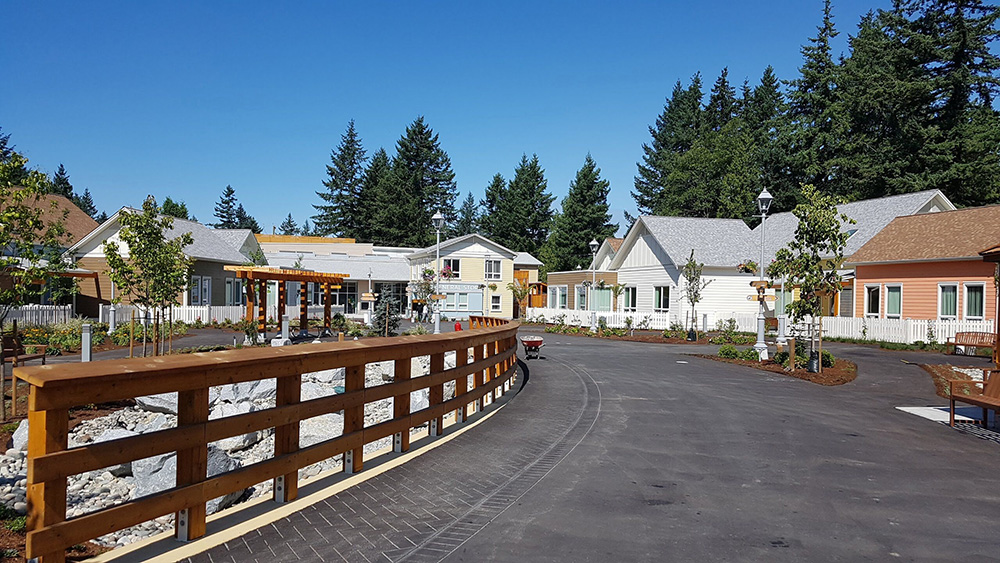On a hot July day I drove out to Langley, British Columbia, to visit the Village, a new dementia-care facility that opened a few days later on Aug. 5.
While it’s new to Canada, the Village is an established concept in the Netherlands and Denmark: a community in which those with dementia can live something like a familiar life rather than be boxed into a few rooms behind locked doors. It’s an encouraging new direction, but its greatest value may lie in finding ways to make such care available to hundreds of thousands of Canadians in the next few decades.
The Village, surrounded by Langley’s suburban sprawl, occupies five acres of quiet near Anderson Creek. Just west of busy 200th Street, it seems both secluded and spacious, a cluster of six “cottages” linked by broad walkways to a barn and garden at one end and a reception building (with bistro and general store) at the other.
Each cottage is designed for 12 residents, looked after by three staff. The residents’ rooms are built around a central space including a kitchen, dining area and social areas. In one social area, an electronic gadget reminds residents, “This is Friday afternoon.” The rooms are a good size, with ensuite bathrooms, and residents can bring their own familiar beds and other furniture.
The impression is more that of a well-run B&B than of a home, but it’s certainly more intimate than, say, Trezevant Manor, a very large “retirement community” that houses hundreds of residents in Memphis, Tennessee.
Village residents are free to roam the grounds (wearing a bracelet that can both check their blood pressure and track their whereabouts), drop in to the bistro or shop for snacks, have their hair done, putter in the garden or work in the arts studio. With 75 residents and almost that many staff, no one will be neglected.

And how much would this cost a resident or their families? The base rate, including meals, laundry and help with bathing and medication, is $7,300 a month. Complex care provides 24-hour nursing care and costs $8,300.
That would be a showstopper for many families who are looking after an aging parent at home. Add up all the costs of a senior living alone in an apartment with drop-in nursing care, however, and the Village may not look quite as bad.
Can you match this?
The design of the Village stems from the experience of the builders, Canbrit, who’ve built retirement communities in Richmond, New Westminster and Lloydminster, Alberta. The Village is clearly based on extensive research, both in Canada and abroad, and it presents a challenge to the very large retirement-community industry: Can you match this?
The match must be not only in the physical construction but also in the staffing. I visited during an open house for those in the industry, and Canbrit executive Guy Thorburn told me the Village had recruited staffers from other care facilities — people who liked the opportunity it offers to do more for residents than they can do elsewhere.
That, of course, puts pressure on the industry to recruit and retain still more dedicated people for a little known and poorly understood profession: caring for old people with dementia.
Pressure on the industry will soon create pressure on the government, which also runs or subsidizes residences for seniors with dementia. As the senior population grows, the need for both facilities and staff will grow with them. Operations like the Village will create demand for more such operations.

From a cynical politician’s point of view, this is disagreeable: They must tax people more to look after other people’s old folks, who themselves are mostly not producing tax revenue. But when seniors’ families are numerous enough, their votes will provide considerable clout.
According to the Alzheimer Society of Canada, over half a million Canadians now live with dementia, and 25,000 more are diagnosed every year. “By 2031, that number is expected to rise to 937,000, an increase of 66 per cent.” The health-care system and caregivers are spending over $10 billion a year to look after them, a cost that will rise to $16.6 billion by 2031 and then keep on rising.
By then, it will be both cheaper and more humane to treat dementia care as a part of medicare. But that will require a massive investment in land, housing and training when we already face a housing crisis in both our big cities and Indigenous reserves, not to mention the demands of a climate crisis, while Canada’s working-age families try to look after their kids and their parents at the same time.

One possibility would be to find economies of scale in housing construction. One promising example is BoKlok, a Swedish consortium of Skanska and Ikea. In addition to building affordable modular housing across Scandinavia and the U.K., BoKlok is also developing homes outside Stockholm for persons with dementia. Like Ikea furniture, parts are largely mass-produced to be easily assembled on site (presumably with more than an Allen wrench). Using government-owned land, whole communities could be built this way.
Staffing them will be more of a challenge. At the moment, the BC Care Providers Association is dedicating $100,000 over the next three years for bursaries at post-secondary institutions offering health-care assistant training. At $3,300 per six-month course, that will cover just 30 students. Clearly we will need far more money and far more people.
Governments can certainly encourage the expansion of such training. Colleges and teaching universities are always eager for new career programs, and would be happy to adapt or develop dementia care programs — and to scale them to meet the demand. Governments should be willing to subsidize tuition and expenses and to guarantee jobs to graduates who meet high standards.
Not all future dementia care communities will be like the Village. Some may be like townhouse developments, others like hotels. None will be quite as comfortable to residents as home. But, done right, they will lift an enormous psychological and economic burden from not only the residents but also their children and grandchildren — that is, from everyone.
This series is made possible by a grant from Bruce and Gail Macdonald. ![]()
Read more: Health


















Tyee Commenting Guidelines
Comments that violate guidelines risk being deleted, and violations may result in a temporary or permanent user ban. Maintain the spirit of good conversation to stay in the discussion.
*Please note The Tyee is not a forum for spreading misinformation about COVID-19, denying its existence or minimizing its risk to public health.
Do:
Do not: